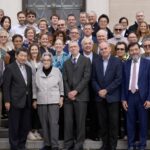School of Dentistry celebrates 30 years of training research scientists in its PhD program20 min read
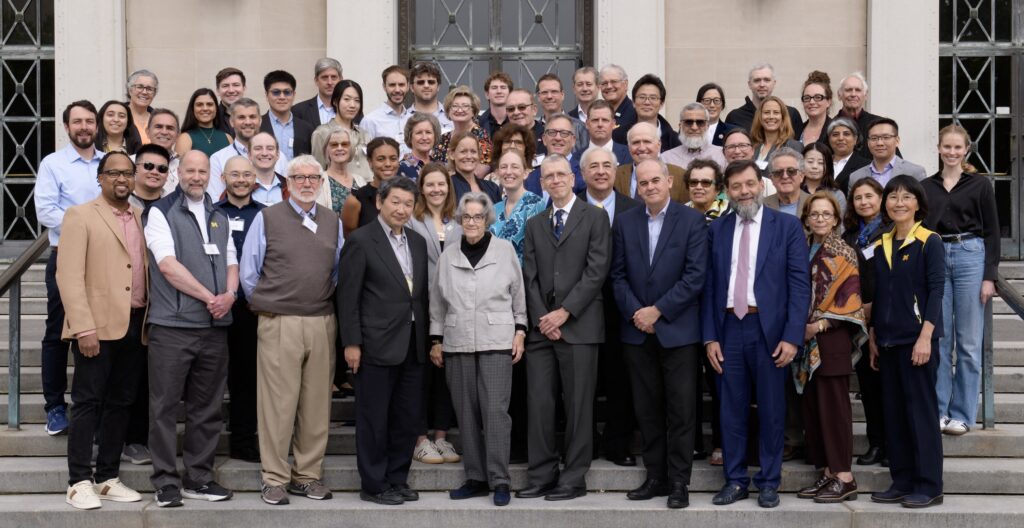
Ann Arbor, Mich., Oct. 16, 2024 – The importance of scientific inquiry related to oral health was celebrated at the University of Michigan School of Dentistry Oct. 4 as the school marked the 30th anniversary of the founding of its PhD program.
In the three decades since the program’s inception in 1993, the school has conferred 54 PhD degrees in Oral Health Sciences to students from around the country and the world. Most of the graduates have gone on to become faculty and researchers in academia or to lead research programs in various health-related fields.
About 20 alumni of the program returned to the school to join with current and former faculty and administrators, and trainees now in the program, for the series of presentations and panel discussions during the day-long seminar. They discussed the history of the program and oral health research in general; the importance of maintaining and funding strong scientific research programs at the university and federal levels; and how effective faculty mentoring is crucial to the success of PhD trainees, the faculty themselves and scientific research.
A program of the U-M Rackham School of Graduate Studies, the PhD program in the School of Dentistry was designed to strengthen basic, translational and clinical research training by building on the school’s longstanding reputation as an international leader in dental, oral and craniofacial research.
Dr. Yuji Mishina, director of the program, presented a summary showing the diversity of students who have passed through the program in 30 years. Slightly more than half have been female students, with students coming to Ann Arbor from 13 countries beyond the United States, including China, Brazil, Taiwan, Saudi Arabia, India, Germany and Peru. The majority have gone on to faculty or post-doc positions after graduation; others became clinicians or work for health-related companies.

U-M Provost Laurie McCauley, the former dean of the dental school, was one of numerous speakers during the day who thanked and praised Dr. Charlotte Mistretta, the faculty member who designed the program from its inception and served as its first director for 17 years from 1993 through 2010. “She built this program with care and attention, and was incredibly methodical in her approaches,” recalled McCauley, who was an assistant professor and researcher in the dental school at that time. “This program would not be in existence without your dedication in launching it.”
Over the last 30 years, Mistretta was followed as director by faculty members Jan Hu, Vesa Kaartinen and Yuji Mishina, the current director. McCauley said their work leading and promoting the program to the school’s administrative leadership and various deans, including herself and current dean Jacques Nör, have reinforced the importance of the dental school program and its importance to oral health science research. “I think all of us have shared the true value and our appreciation for graduate education and what it has done for our school as well as our profession,” she said.

In his introduction of Mistretta, Kaartinen, now Associate Dean for Research, credited her with setting up a structure to the PhD program that ensured its success through the present day. He presented awards of appreciation to Mistretta and Patricia Schultz, business manager of the Research Office, who helped implement the program in its early days and solved countless problems as they arose in the early years.
Mistretta, who is the William R. Mann Professor Emerita of Dentistry in the Department of Biologic and Materials Sciences & Prosthodontics, spoke to the history of the program, including the importance of academic advisors and faculty mentors who worked closely with each PhD student; the generous support of school administrators and faculty as the program was created and grew in its early years; the creation of a Seminar Series and a Journal Club so that students could meet leading researchers and become more familiar with publishing research; and many other aspects.
She noted several facets of the mission of the program that continue today:
• To train outstanding students to become advanced research scientists in their field of specific interest within the oral health sciences.
• Provide students with an understanding of the functional, structural and molecular properties of the oral region.
• Lead research in developmental craniofacial biology, mineralized tissue biology and musculoskeletal disorders, oral and pharyngeal cancer, oral infectious and immunologic diseases, oral sensory systems and central circuits, and tissue engineering and regeneration.
• Prepare dental scientists who will be strong candidates for faculty positions in dental schools at major research universities.

Program origins
The program emerged from a time of significant reorganization of the dental school in the late 1980s and early 1990s, as part of a directive from Dr. James Duderstadt, then-Provost and later President of the university. Duderstadt named dental school faculty member Dr. William Kotowicz as interim dean to lead a Transition Committee, from 1987-89, that would reduce the number of departments and increase the dental school’s collaboration with the rest of campus, particularly with the other health science disciplines.
Mistretta served on the Transition Committee, which identified many comprehensive changes for the school, including the need for a robust PhD program. It would be one of the significant ways the School of Dentistry could meet its new directive to collaborate more closely with the rest of campus. It would provide myriad opportunities for PhD students at the dental school to interact with the broad, world-class scientific research community in departments all across campus.

Kotowicz initially led the school reorganization, which was then continued under a new dean, Dr. Bernie Machen, who arrived in 1989. In 1993, Machen asked Mistretta to develop and lead the new PhD program.
The job started with convincing the Rackham dean and executive board that the dental school needed its own PhD program. Mistretta and her team needed to put together a roster of graduate faculty with significant research credentials, design the curriculum components, reach out to research mentors and advisors around campus, and generally convince Rackham that the dental school was building a culture of high-end scientific research. The plans were ultimately approved by the graduate school and the first students enrolled in the program in 1994.
The first students were an international mix. In 1994, the first four students were Hongjiao Ouyang from China; Brazil native Jacques Nör, who had just completed his master’s degree in pediatric dentistry at the dental school; Esam Tashkandi from Saudi Arabia who joined the program after earning his master’s degree in prosthodontics at the school; and Somjin Ratanasathien from Thailand. By 2000, the number of students had grown to 17, approximately the same number in the program today.

Mistretta said an integral part of setting up the program and getting off to a strong start was the hire of Patricia Schultz as Research Office business manager. “She had to build an office, along with ties to Rackham, peer programs across campus and nationally, and ties with the university’s Office of Vice President for Research. But she also had to build trust with our students, and along the way make sure we had funding. Most importantly, Pat set a tone for that office. The tone was never, ‘We couldn’t do that.’ The tone was ‘What are we going to do? How do you do it? And, do it.’ That was Pat and that was our office.”
As the program grew, it eventually added dual degrees for students who wanted to earn their DDS degree or master’s degree in one of the dental specialties at the same time they were earning their PhD. That expansion required complicated planning and negotiations with departments throughout the dental school that were accustomed to DDS and MS programs operating independently.

For both the start of the PhD program and during its evolution over the 30 years, Mistretta said it has always been about the contributions of many talented people dedicated to the success of the students, the program and the dental school. After the original mandate to reorganize the dental school by Duderstadt, other important contributors who worked tirelessly on the details and structure started with William Kotowicz and Bernie Machen in their roles as deans of the school. Others who were instrumental (and their titles at the time) included Director of Research Christian Stohler; Lisa Tedesco, Associate Dean for Academic Affairs; Marilyn Woolfolk, Assistant Dean for Student Services; the PhD program directors who followed Mistretta; the leaders of the school’s Research Office; successive deans; and many support staff and other faculty members who have contributed expertise and funding to the program over the 30 years.
“To have some backing, have some support, to have people who want to think it through, and people who really are acting on principles and excellence – that’s what we had and still have,” Mistretta said. “And every time one of the students is excellent, we can find satisfaction in that.”
“In the end, it’s about our trainees,” she said. “That’s the deal – taking them to excellence and maintaining them and always being there with them.”
Alumni return
Some of the approximately 20 PhD alumni who returned for the celebration were presenters who discussed the benefits of the training program for their careers and for scientific research in general. Others returned to reconnect with fellow alumni and faculty members and reflect on what became a common refrain during the day – how the program changed their lives.

Alumna Yong-Hee Chun is an associate professor in the Department of Periodontics at the School of Dentistry at the University of Texas Health Science Center at San Antonio. After earning her master’s degree in periodontics from the dental school, she was accepted into the PhD program, graduating in 2009. Like several of the speakers during the day, Chun addressed the importance of faculty mentoring. She said she had the good fortune of working in the lab of faculty members James Simmer and Jan Hu, both of whom provided her with an introduction to big-time scientific research and career guidance. “It was like finding a treasure for me,” she said of their mentoring and the PhD program.
“I remember that I spent many hours in their office located next to their lab,” Chun said. “Jim explained to me what it is like to make a scientific discovery. I was a student coming in with all these big plans and big dreams for making big discoveries and such. But he grounded me and he said that scientific discovery is really pushing the envelope just a little bit, in the greater scheme of the entire field, and you keep pushing just a little bit, and you keep pushing.”
“It is very humbling,” Chun said. “It starts out with very solid observations and small, incremental findings. It takes collaboration and hard work.”
“What was most important for me,” Chun said, “was that I could sense a great deal of passion for science in Jan and Jim.”

Dr. Solaiman Al-Hadlaq is one of two PhD alumni who traveled from Saudi Arabia for the anniversary event. Both he and Dr. Esam Tashkandi are faculty at the College of Dentistry at King Saud University in Riyadh. Tashkandi was one of the four students in the program’s first cohort and Al-Hadlaq joined the program three years later, as he was finishing his MS degree from the school. He earned his PhD in 2002.
Al-Hadlaq said he made the long trip back to Ann Arbor because the U-M PhD program is “very near and dear to my heart” and he is grateful on many levels to Charlotte Mistretta, who was his dissertation advisor. “I spent a good five years in the program. I have all good memories. I grew here scientifically, personally, character-wise. I owe a lot to the program. I found this an opportunity to come back here and meet with a lot of mentors, teachers and fellow alumni. And to meet the new students. It was worth the trip to come and see everybody here.”
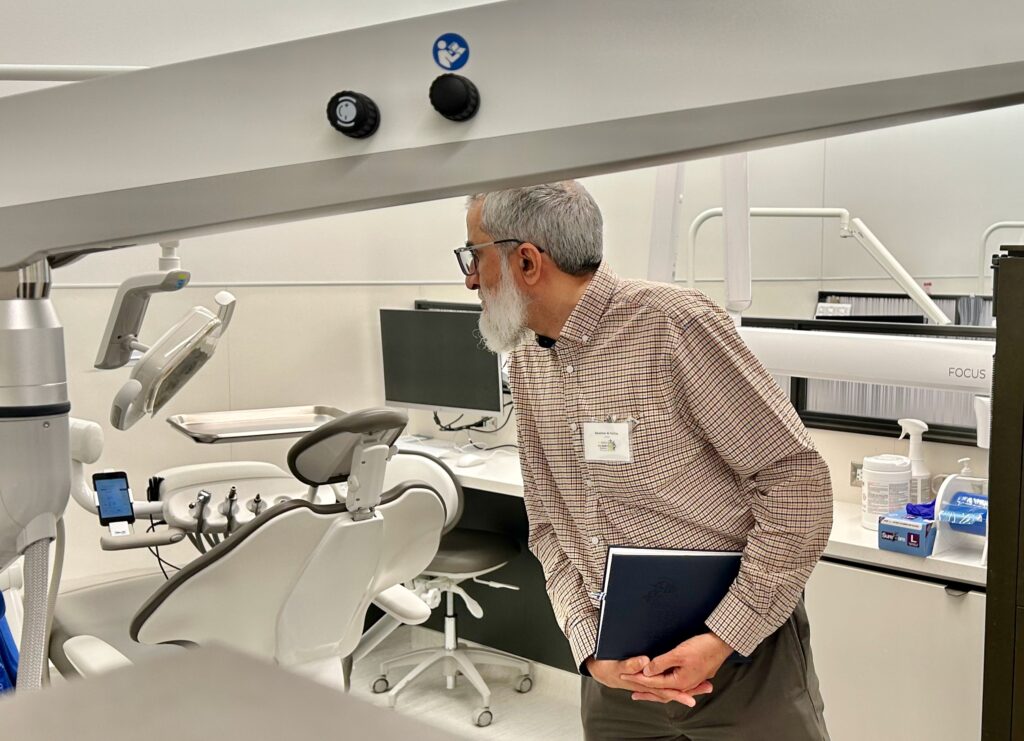
A professor of Endodontics in the Department of Restorative Dental Sciences at King Saud, Al-Hadlaq teaches undergraduate and graduate students, supervises PhD students, does clinical work and formerly handled administrative duties. “I think what makes Michigan stand apart from other institutions is its investment and emphasis on the science, and that necessarily reflects on the students,” Al-Hadlaq said. “You could say, ‘We are only going to teach them clinical skills, what are they going to do with the science?’ But believe me, when it comes to teaching, I can see the difference between someone who has a PhD degree versus someone who doesn’t. You are planting the seed for them for curiosity, for critical thinking, for trying to understand what they are doing, rather than just doing it.”
Dr. Julie Marchesan, a 2013 alumna of the program, is an assistant professor at the Adams School of Dentistry at the University of North Carolina. Her research lab focuses on the pathogenesis of periodontal disease, more specifically the role of pathogen recognition receptors and sensors and novel pathobionts in the host response.
“I really learned how to be a scientist and develop critical thinking, and to really question myself,” she said of her time in the program. An important element was being pushed out of her comfort zone by her mentor, who suggested she should collaborate with researchers at the U-M medical school, which turned out to be a confidence-builder and a lasting research-networking lesson that she likely wouldn’t have pursued without her mentor’s trust and encouragement.
Another continuing benefit of the PhD program is a small informal peer group, called “OHS Buddies,” that Marchesan started a few years ago with four other graduates of the U-M program, plus Mistretta. The group may grow since several alumni who learned of the group at the anniversary event have asked to join. About every three months, the group gathers online to discuss whatever any member of the group wants to discuss. Although research questions come up, its main purpose is to discuss non-research topics, for example, the factors involved when considering a job move, how to negotiate salary, the “politics” of being part of an academic department, and self-advocacy.
“When you walk through academia, you encounter difficulties that you don’t encounter in your PhD training,” Marchesan said. “And you want to have a safe place and people you can talk to. I’ve had advice from senior faculty, but I wanted to talk with people who had the same training I did. Usually there is a question that someone has encountered and would like everyone’s opinion. It has made a big difference. You can’t always have the same talk with other people.”
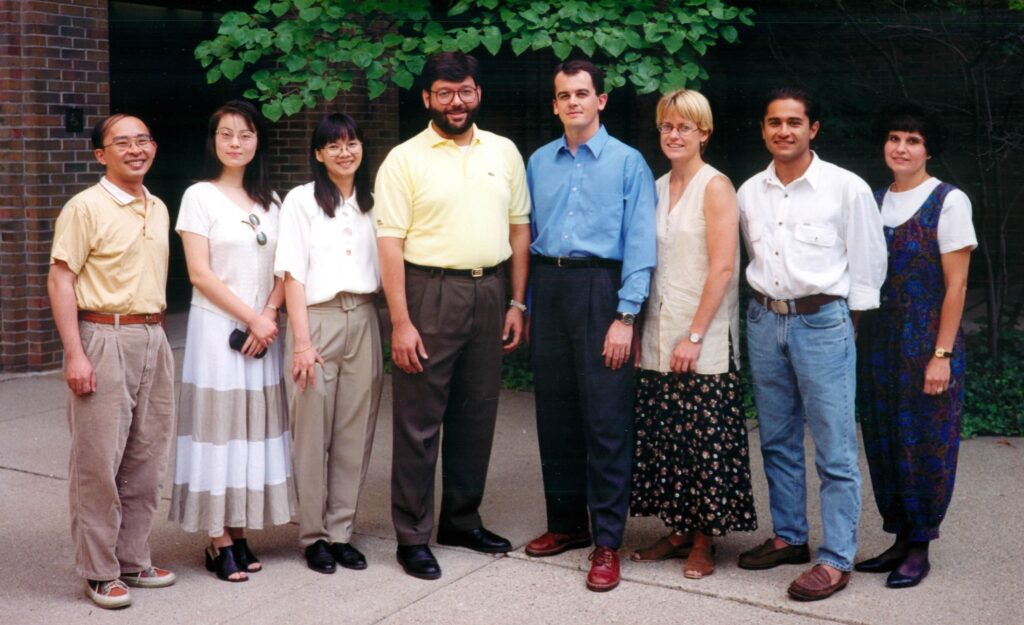

In his closing remarks, Dean Jacques Nör said many people deserve thanks for the success of the PhD program, especially Mistretta. “Charlotte had the vision and the drive with a blank canvas in front of her to develop what we have today,” he said. “In the beginning, there was no template for this. Charlotte embraced the challenge and she had the courage to take this forward, bringing students from all over the world. As we see these presentations today, and see who is in the audience today, the program transformed so many lives.”
On a personal note, Nör added: “When I look at my life, I think the PhD training was the most transformational program in my life, and I had a few of them over the years. The PhD changed the way that I am, the way that I think, the way that I behave, and had a tremendous impact on me. The impact you had on our lives is immeasurable, and for that, we thank you.”
Nör urged attendees to continue to advocate for scientific research and federal funding related to oral health research, and for PhD training programs to ensure an adequate supply of research faculty around the country. He noted that most new dental schools opening in the U.S. do not have a research program like U-M’s and that federal funding for research could decline.
“We have a tremendous responsibility for all the dental schools that are research intensive to continue to develop talent and continue to train scientists, to continue to train dentists who care about evidence, to continue to strengthen our PhD programs,” Nör said. “Our commitment here in this school is a very strong commitment to the PhD program, a commitment to work together with the PhD leadership to make this program ever stronger, to continue this legacy that Charlotte started and now we have this responsibility to continue.”

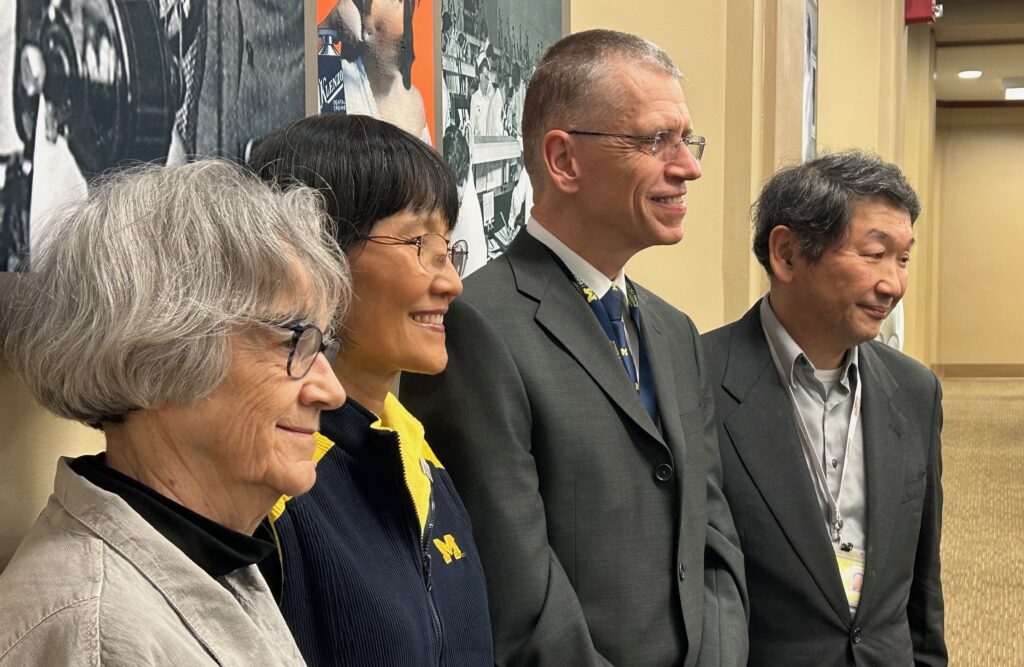
###
The University of Michigan School of Dentistry is one of the nation’s leading dental schools engaged in oral healthcare education, research, patient care and community service. General dental care clinics and specialty clinics providing advanced treatment enable the school to offer dental services and programs to patients throughout Michigan. Classroom and clinic instruction prepare future dentists, dental specialists and dental hygienists for practice in private offices, hospitals, academia and public agencies. Research seeks to discover and apply new knowledge that can help patients worldwide. For more information about the School of Dentistry, visit us on the Web at: www.dent.umich.edu. Contact: Lynn Monson, associate director of communications, at [email protected], or (734) 615-1971.

